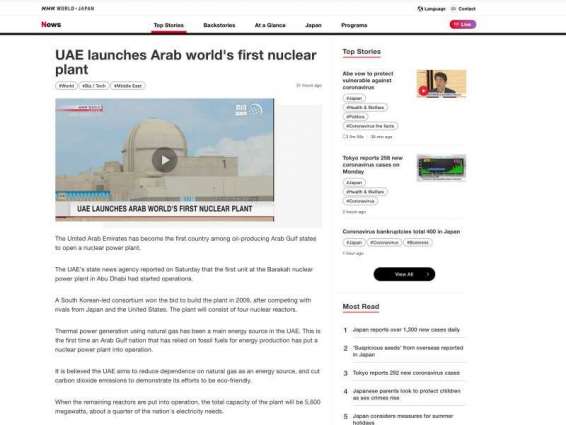By Binsal Abdulkader ABU DHABI, (Pakistan Point News - 03rd Aug, 2020) International media have prominently covered the United Arab Emirates starting up the first nuclear power plant in the Arab World on Saturday.
As Unit 1 – out of four reactors – started working, the power plant added to the country’s successes this year, just a few weeks after launching the Hope Probe to Mars, the first ever interplanetary Arab mission to explore the Red Planet.
CNN quoted the International Atomic Energy Agency, which oversees the use of nuclear energy around the world, as hailing the plant's inauguration as "an important milestone."
Washington Post in its report highlighted the US praising the UAE’s nuclear programme for agreeing never to acquire enrichment or reprocessing capabilities, which is "a model agreement for other countries seeking nuclear power while also encouraging the non-proliferation of nuclear weapons."
New York Times reported that once the UAE’s four units are all running, the plant would provide a quarter of the country’s electricity, while Bloomberg said, "With the start-up of the Barakah reactor, the UAE joins a club of 30 countries that can generate nuclear energy."
International news agency Reuters quoted the tweet of His Highness Sheikh Mohammed bin Rashid Al Maktoum, Vice President, Prime Minister and Ruler of Dubai, who announced the historic development.
United Press International, UPI, a US-based international news agency, detailed the operation of the nuclear power plant by saying, "the reactor safely produces heat, which is used to create steam, turning a turbine to generate electricity."
BBC headlined the report "Barakah: UAE starts up Arab world's first nuclear plant," spotlighting that "The oil-rich UAE wants Barakah to meet a quarter of its energy needs, as it adopts more sustainable energy sources. Just two weeks ago the UAE sent a probe on a mission to Mars - another high-profile scientific first for the Gulf nation."
British newspaper The Independent mentioned that "when completed, Barakah will have four reactors with 5,600 megawatts (MW) capacity."
French tv channel France 24 quoted a tweet of Hamad Alkaabi, the UAE’s representative to the International Atomic Energy Agency, saying, "This is a historic milestone for the nation with a vision set to deliver a new form of clean energy."
Deutsche Welle, DW, Germany’s international broadcaster, quoted a Gulf analyst as saying the plant was part of the UAE’s drive to diversify its energy economy, reduce dependence on fossil fuels and project its image as a regional leader in science and technology.
The Australian, a newspaper published by News Corp Australia, said the UAE has scored "another first for the Arab world," with Barakah nuclear power plant.
China Global Television Network, CGTN, reported that "The UAE has reiterated its nuclear ambitions are for peaceful purposes and moved to dispel any concerns over safety."
NHK World Japan, the international arm of the Japanese public broadcaster NHK, said that with nuclear power plant, the UAE aims to reduce dependence on fossil fuel as an energy source, and cut carbon dioxide emissions to demonstrate its efforts to be eco-friendly.
Yonhap, a South Korean news agency, reported the development with a headline "UAE begins operations at S. Korean-built nuclear reactor," which highlighted South Korea’s partnership in the project.
The Korea Herald, an English newspaper in South Korea, quoted a statement of Korea Electric Power Corporation, KEPCO, a partner in the project, saying the first reactor in the Barakah plant is increasing its output and will send electricity after some tests are finished.
Straits Times, an English daily in Singapore, reported the UAE has insisted that it intends to use its nuclear programme only for energy purposes.
The Jakarta Post and The Daily Star, English dailies in Indonesia and Bangladesh respectively, quoted Mohamed Ibrahim Al Hammadi, CEO of the Emirates Nuclear Energy Corporation, as saying, "We are now another step closer to achieving our goal of supplying up to a quarter of our nation's electricity needs and powering its future growth with safe, reliable, and emissions-free electricity."




